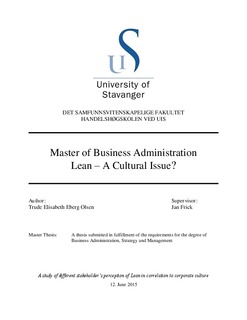| dc.description.abstract | Lean has been a growing trend among companies who want to achieve greater efficiency, less waste of labor and materials and achieving competitive advantage. Lean is an area that many researchers have explored, but there still exists misinterpretations of the concept and its function. Lean can be regarded as both a practical sense where the application is based on tools and methods, or it can be interpreted as a philosophy, where the concept should be integrated into the culture and the leadership style in an organization. A known perception is that there often exist a lack of focus or an inability of organizations to create a culture that will sustain Lean as a continuous change- and improvement process. On this basis, I wish to look at perceptions from various participants from different organizations, and their opinions regarding Lean and Lean as a cultural issue.
How do various stakeholders perceive Lean in correlation with corporate culture, and what consequences might this have for desired results for different companies implementing Lean in the region?
An assumption is that the culture in an organization has an impact on performance, and that the perception of Lean in relation to culture therefore has an effect on desired outcomes. Furthermore, it is assumed that perceptions will vary between those participating in this study. It is desirable to identify differences, and to consider how this may affect results, as well as collaboration across organizations.
From using a qualitative method and a comparison of different perceptions among different companies, I wish to evaluate similarities and inequalities in perceptions. The strategic selection of participants is based on selecting candidates from companies from different industries. One representative from each company participate in individual interviews. The information attained from the interviews serves as a basis for the analysis.
The study have found that there are variations in perceptions of Lean among the various stakeholders. The majority of the participants consider Lean as both a set of tools, and a philosophy or a mind-set. The variations revolve mainly around what aspects of Lean they consider as more important, which tools they have implemented and the results they have achieved. Based on the analysis, it is interpreted that those companies who focus more on communication and cooperation both internally and externally, experience a greater success and are generally happier with their results from implementing Lean. In addition, it is perceived that challenges described with the Lean concept, are generally due to a lack of fellowship and lack of a common understanding of the Lean mind-set. Communication and information-flow between senior management, managers and other staff is therefore considered as essential for succeeding with Lean. It is considered that by having a consistent understanding of Lean that includes all employees throughout the company, and realizing that it is not only for some parts of the company, can contribute to a more successful implementation of Lean. | nb_NO |

